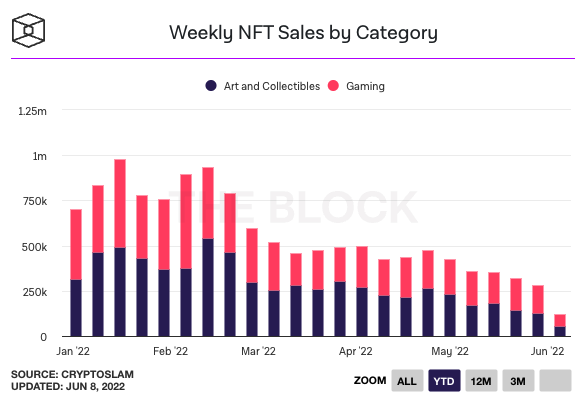The consumer trading boom has deflated, pushing unicorns and recently public companies alike into defensive modes. The decline in consumer trading activity is also extending to newer categories of assets, data indicates, like non-fungible tokens (NFTs).
Per The Block’s data arm, weekly NFT sales declined by just over 70% from a high of nearly 1 million units in the third week of 2022 to a little more than a quarter-million in the most recent week in the dataset, which began in the final days of May. The decline in NFT sales volume is not new, but it has grown in severity in recent weeks, adding fresh heft to the argument that the crypto or web3 market is in a period of correction — what some describe as a “winter.”
The decline in NFT sales does not come amid a freeze in recent funding rounds for NFT-focused companies, however. A quick scan of TechCrunch headlines in fact shows the opposite. Sure, Yuga Labs of Bored Ape fame raised a $450 million round from a16z at a lofty $4 billion valuation in March, but there has been much activity since that event.
In April, Glow Labs raised $4.15 million in seed capital for its NFT-related project that wants to help “creators to deploy a smart contract with no coding required in a matter of seconds, allowing them to create customized loyalty offerings without as much hassle,” as we wrote. In early May, Americana raised $6.9 million for its plans to help “brands and creators to turn physical items such as streetwear, collectibles, cars and artwork into NFTs.”
The list of recent NFT-related deals continues. Zora Labs raised $50 million in May; its protocol, TechCrunch said at the time, “allows artists and developers to create NFT marketplaces and collections.” Less than a week later, Arianee announced that it had raised $21 million for its work assisting “digital ownership and authenticity certificates on behalf of partner brands.” And in late May, Ayoken raised $1.4 million for its creator-focused NFT marketplace.
All those funding events are predicated on the NFT market growing. TechCrunch cited data in April, for example, that the NFT market reached $41 billion in 2021, and another source said around the same time that the market could double this year. Maybe, but it doesn’t look that way:

Image Credits: The Block Data
The included chart echoes information collected on the Dune crypto-data platform tracking volume on the OpenSea NFT marketplace, a leading location for buying, selling and creating new digital signatures pointed at particular bits of art or other items.
This is not an exercise in knocking back a few shots of haterade. Instead, it’s a reminder that consumer demand for products like digital collectibles is fickle and ever-changing; it does not simply go up and to the right as B2B SaaS revenues tend to, for example. This is at once a feature and a bug, as companies ready to catch an upswing in consumer demand can see their value rapidly appreciate. Such was the case with Robinhood and Coinbase, which rode rising consumer demand for both speculation and investment in equities and crypto products during the 2020-2021 period all the way to the public markets.
That each is now dealing with falling consumer demand — with Coinbase going as far as freezing hiring and yanking some extended employment offers — is likely not unrelated to what we are seeing with NFT market.
I raise the above chart and contrast it with recent fundraising news because we have seen the crypto-focused fundraising market stay bullish longer than what we have observed in other technology areas. Even more, the gap between crypto startup valuations and others has grown in recent quarters, as investor Turner Novak noted recently on Twitter, citing PitchBook data:
Thus we can infer that the recent NFT-focused startup fundraising events did not take place at conservative pricing levels. This makes the apparent downturn in NFT sales all the more troubling; a lot of capital has been deployed into products aimed at serving a market in at least temporary decline. Naturally, with fresh funds, the companies mentioned above are not in danger of running out of money in the near term — and may have enough cash to wait out what could prove to be a temporary dip in NFT-related market demand. We’ll have to see.
